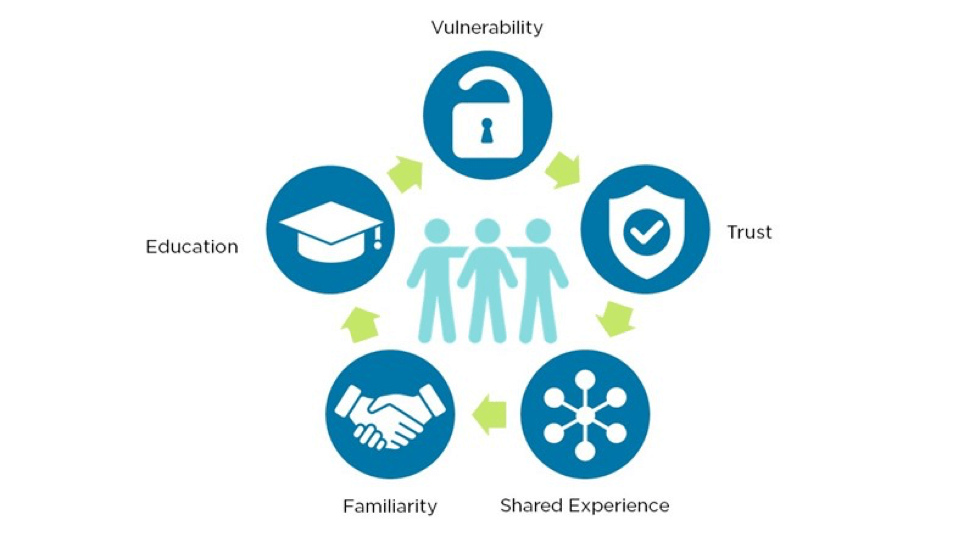
In our work with multigenerational business families, those with the strongest relationships have the most robust group identity and team mentality. So, how do we nurture these relationships? The following five foundational characteristics of successful, productive relationships are essential to next-gen team building.
1. Be Vulnerable
Vulnerability, the ability to be honest, forthright, and emotionally available, makes relationships real. The Merriam-Webster dictionary takes this definition a step further, defining vulnerability as when we are “capable of being physically or emotionally wounded.”
Ways to foster this openness include sharing “learning by failure” stories, regrets in life and gratitude letters in which family members share what they appreciate about one another.
Vulnerability among family members can push many people out of their comfort zone, and so it’s necessary to create a safe environment. A code of conduct can help provide some guidelines for how family members interact in these situations. In many cases, a professional facilitator can help create an atmosphere in which family members can deepen their vulnerability, even if that is in small degrees. To engage in any amount of vulnerability, there must be a foundation of trust amongst the family.
2. Build Trust
In his book, The Speed of Trust, Stephen Covey asserts: “Trust is equal parts character and competence.” Trust is the both explicit and implicit understanding among people that is gained over time by being accountable and delivering on your promises. In a group, trust is a shared assurance of the team members’ individual abilities, strengths and reliability. It is a vital component of family businesses and is both a precursor and result of next-gen team building.
3. Share Experiences
People build relationships through shared experiences. This is true for profound experiences that bring families together, and through continuous smaller interactions (such as sharing meals together) that produce familiarity. These activities can be entertaining, meaningful and educational like going bowling together, volunteering, creative problem solving, personality testing or simply going on a group hike. Initiatives that are challenging and require problem-solving such as the popular escape rooms have also produced great experiences for our client families. Shared experience as a family fosters a sense of commonality and familiarity. If the event helps people learn new skills or discover new aspects of other family members, it is even more significant.
4. Gain Familiarity
Familiarity is based on shared experience and the aspects that people have in common. As families grow and spread out geographically, building a sense of familiarity and comfort around one another becomes even more important. Familiarity in this context helps people understand the multiple roles and perspectives of being family members, owners and managers. Check-ins such as: “What is new in your life since the last time we met?” or games such as Two Truths and a Lie can help more distant family members build closeness.
5. Encourage Learning
For a group of next-generation leaders to be successful as a team, there needs to be a fundamental level of family business knowledge and education. To build this foundation, there should be an understanding around several subjects to productively participate in an ownership group including:
-
Family and business history
-
Business 101 covering basic financial and business skill sets such as reading a balance sheet
-
Skills in decision making, communication, and conflict resolution
-
Understanding the family’s governance structure (code of conduct, family constitution, employment policy)
-
What it means to be a family business owner including responsibilities and expectations
We have found the most successful of family businesses find a way to incorporate family business-based education and learning specific and appropriate for each generation. This can spark teambuilding within each age group.
Bringing It All Together
We should point out that these elements operate in a circular, iterative fashion. Each must be included and work in conjunction to build a successful team of next-generation leaders. When families invest in these elements, we see them building on one another in a positive cycle.
Vulnerability, trust, shared experience, familiarity and education are essential for fostering successful teams within the next generation. With proper planning and attention to these elements, families can support the development of strong next-gen teams. Stronger next-gen teams produce committed ownership groups and a deeper commitment to family values.

Nicole Zeidler and Joshua Nacht, Ph.D. are consultants with The Family Business Consulting Group, Inc., a leading management consulting firm serving the unique needs of multi-generational family businesses worldwide.
Joshua is also a faculty member of the Family Enterprise Planning Executive Education program with the College of Charleston School of Business. To learn more, visit go.cofc.edu/FEP.









